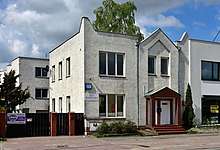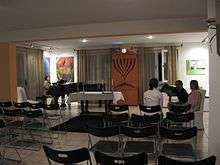Beit Warszawa Synagogue
Beit Warszawa Synagogue is a liberal Jewish synagogue officially opened in 1999 in Warsaw. It operates as a full-fledged synagogue with regular events, including Friday night and Saturday morning prayers. Beit Warszawa is a member of Beit Polska, the umbrella organization for the Progressive/Reform Judaism in Poland.
| Beit Warszawa Synagogue in Warsaw Beit Warszawa | |
|---|---|
 | |
| Religion | |
| Affiliation | Reform Judaism |
| District | Wilanów |
| Ecclesiastical or organizational status | active synagogue |
| Leadership | rabbi Gil Nativ |
| Location | |
| Location | Warsaw, Poland |
| Geographic coordinates | 52°10′31″N 21°04′37″E |
| Architecture | |
| Style | Modernism |
| Completed | 2003 |
| Website | |
| www.beit.org.pl, www.jewishrenewalinpoland.org | |
Origins
Beit Warszawa started in 1995 when Seweryn Ashkenazy gathered a group of friends to explore the possibility of creating a reform synagogue. Previously, the only choice had been the orthodox Nożyk Synagogue[1] in the centre of Warsaw. Initially, Oneg Shabbat were held once a month in the house of one of the congregants. However, as time passed and the community grew, Shabbat started to be held every Friday night. Increasingly various events were held during the week as well.
In 2000 Cynthia Culpeper became the first female rabbi to lead religious services in Poland when she conducted High Holy Day services at Beit Warszawa.[2]
The congregation moved from a rented flat into dedicated premises at ul. Wiertnicza in Warsaw in 2003.
In June 2012, Beit Warszawa announced the appointment of Rabbi Gil Nativ as rabbi. Rabbi Nativ comes to Beit Warszawa after years of experience in Cincinnati, Los Angeles, and Israel. The long illness of Rabbi Schuman forced his resignation. Rabbi Daniel Alter served on an interim basis during the initial period of Rabbi Schuman’s illness. During the autumn of 2011 and spring of 2012, Rabbi Reich, Rabbi Bruce Kadden, and Rabbi Beliak filled in.
Beit Warszawa Synagogue today
Attendance

Beit Warszawa Synagogue has an attendance of around forty to eighty people on most Friday nights. Attendance on Saturday mornings is well above the minyan. On important occasions such as Passover or Rosh Ha Shana the synagogue is full. There are regular courses in Hebrew and Judaism as well as cultural events such as lectures and films. The people who belong to this synagogue are often people of Jewish descent who were raised as Christians and did not know that they were Jewish, as well as American Jews living in or visiting Poland and growing numbers of Israelis with Polish roots. Increasingly the five medical schools teaching in English at Polish universities have attracted Jewish students, who have attend services at Beit Warszawa. There are also converts without known “Jewish roots” and Israeli families who have joined the community.
Thirty-five principles of Progressive Judaism in Poland
Thirty-five principles of Progressive Judaism in Poland: A Path of Our Own. There is a unique challenge to build a Jewish community with a two generation gap. The elders cannot teach because they were deprived of a Jewish education and the younger generation must have a compelling vision that will allow for the realities of Polish life. In response, the community has developed a statement of its principles: http://beit.org.pl/images/PDFs/mission_statement_A4_ENG.pdf%5B%5D.
Youth activities
Sunday School, Day Camp and now, Summer Camp, the youth of Polish Jewry have a growing system of formal and informal education. The Sunday School has attracted young people through the school year. The teachers and staff create a fun learning environment that includes not only Biblical stories, but their own movies and outings. Horseback riding and music lessons are part of this unique experience. During the summer there is a day camp that celebrates Jewish holidays especially the weekly Shabbat with the baking of Hallah. Naturally, there are the visits to the swimming pools and museums. This summer, the youth movements of Progressive Judaism in Poland and Germany, Beit Polska and Netzer, are joining together for a two-week overnight camp. This will be the first meeting of Jewish young people from the Progressive (Reform) movement since 1927.
Lay cantors' program
Under the leadership of Rabbi Burt Schuman and Mimi Sheffer, a lay cantors' program was established in the Fall of 2010. The program continues to produce talented Polish speaking prayer leaders in a unique course. Great effort was invested in translating into Polish key essays concerning Jewish prayer and prayer leadership. The curriculum and training of this course will prepare a new generation of prayer leaders; some of its members are pursuing further Jewish education. The contributions of Rabbi Bruce Kadden and Barbara Kadden in this effort were crucial in providing a basis for the curriculum. In its first year, the program graduated six leaders who are competent to lead Shabbat services. Four members of that class are studying to become High Holiday and Festival service leaders. The second class has eight members and will graduate in October 2012.
Monthly services are held in communities throughout Poland sponsored by Beit Polska and led by graduates of the lay cantors’ program. This new program allows for communities to begin to celebrate Shabbat and other holidays in a welcoming and egalitarian manner. Participation in singing and a joyous sense of gathering are the hallmarks of the Shabbat celebrations.
Beit Polska Siddur (prayer book)
Under the leadership of Rabbi Burt Schuman a siddur, that addressed modern Jews in, Polish, their native language, together with a transliteration of the Hebrew was completed. In May 2012 the “test drive” of this prayer book began. The plan calls for a year of experimentation and study that will lead to a definitive printing of the prayer book that will also contain passages of Jewish wisdom. The arrival of the prayer book has met with much excitement and discussion. In the coming year, Beit Warszawa will be collecting suggestions and comments that will help finalize the siddur.
Courses outside Warsaw
Plans are advancing for Step by Step classes in six key cities outside of Warsaw. Step by Step is a popular and successful program that provides a path to learning and in many instances to conversion. Dozens of graduates of the Step by Step program are members of Beit Warszawa and other Jewish groups.
In the Fall 2012, the Step by Step program will be offered in six other Polish cities including Lublin, Lodz, Katowice, and Poznan, Gdansk, and Wroclaw. The Step by Step classes are an opportunity for formal class room learning and the celebration of Shabbat and Jewish holidays. The special circumstances that existed in Poland until 1989 discouraged affiliation or identification with Judaism.
The Beit Warszawa synagogue fostered the development of the umbrella organization called Beit Polska. Beit Polska is active in Gdansk, Lodz, Lublin, Wroclaw, Katowice, Czestochowa and other Polish cities. The Jewish Renewal in Poland website tells more of the story.
Recognition
Beit Polska Union of Progressive Jewish Congregations is recognized as a separate religious entity registered under number 171 of the Church Registry held by the Ministry of Interior. With the Polish Interior Ministry’s recognition the right of Progressive Jews to organize and pray in their own egalitarian fashion is formally recognized.
The decision of the Ministry was upheld in administrative courts despite challenges by the "Orthodox" establishment called “Twarda.” “Twarda” claimed that Polish law granted it a monopoly over all things Jewish. The recent interference of German and Russian trained rabbis only supports the strong suspicion of intolerance from “Twarda.” The attempt by "Twarda" to limit religious expression is being vigorously challenged by associations of Human Rights Lawyers and by Beit Polska.
Twarda’s hiring of one Reform Rabbi who is under the supervision of the Orthodox rabbi was met with skepticism in the entire Jewish world. The hiring of one Reform Rabbi after twenty years of fifteen or so Orthodox rabbis suggested not change, but a calculated attempt to pursue policies that served the Orthodox establishment and not the needs of Polish Jews. This has resulted in thousands of dollars expended on lawyers.
In an interview with Beit Polska’s Rabbi Haim Dov Beliak he stated that “unsuspecting American philanthropists have often given vast sums to this the pseudo-Orthodox establishment that prefers memorial projects over building Jewish Polish life.”
References
- Alan Heath The Nozyk Synagogue https://www.youtube.com/watch?v=ASsEkjrLq-c
- "Community Mourns Loss of Rabbi Cynthia Culpeper, 43". Deep South Jewish Voice. August 29, 2005. Retrieved 2012-10-14.
External links
- www.beit.org.pl official Beit Warszawa website
- Beit Warszawa Synagogue at Museum of the History of Polish Jews, Virtual Shtetl